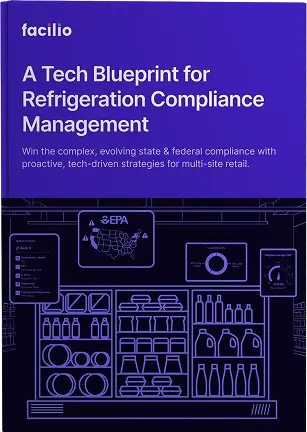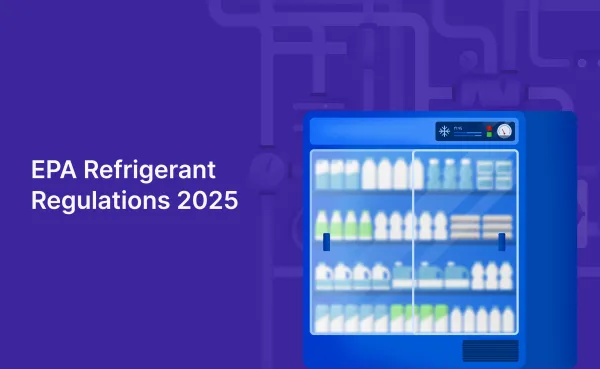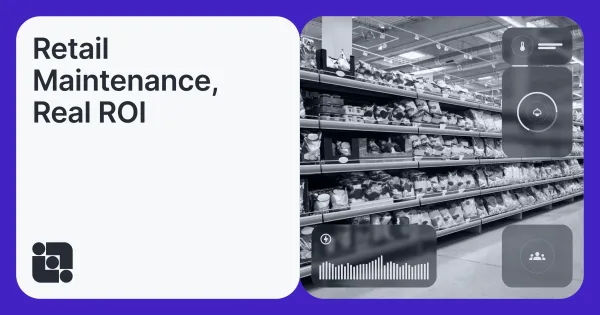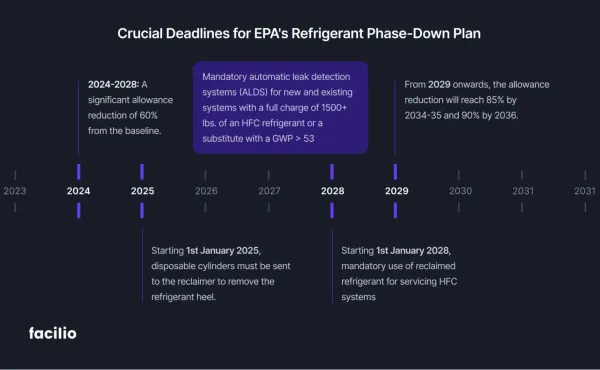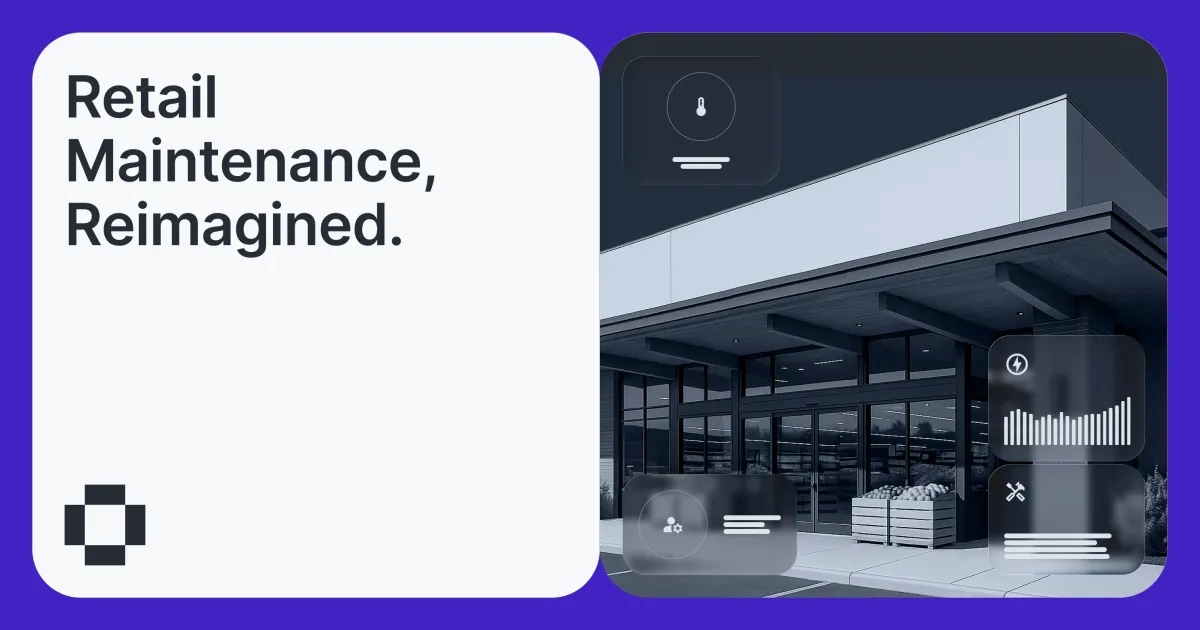
How to Choose the Right Retail CMMS for Multi-Store Operations in 2025
Managing infrastructure across multiple retail locations is tough—and expensive when things go wrong. HVAC or refrigeration failures can cost thousands in lost sales and inventory.
Now multiply that risk across dozens of stores, and the case for a smarter solution becomes clear.
A retail-specific CMMS helps cut losses, reduce downtime, and drive real return on investment from its implementation.
In this blog, we break down the challenges of multi-site retail maintenance, what to look for in the right CMMS, and compare 6 top retail CMMS platforms to help you choose the best fit.
What are the challenges unique to retail maintenance operations?
Retail maintenance management isn’t just about fixing things when they break—it’s about keeping hundreds of moving parts running smoothly across multiple locations. And unlike other industries, even minor disruptions can have an immediate impact on revenue, brand reputation, and customer experience.
Here are the challenges unique to the retail industry in the United States:
1. Multi-location coordination is a logistical maze
Each store has its own layout, equipment, and staff, but maintenance needs to be consistent across the board. Central teams often struggle to get real-time visibility into what’s happening on-site, which delays decision-making and creates inefficiencies.
2. Cold storage isn’t just another asset—it’s mission-critical
Grocery stores, convenience chains, and QSRs rely heavily on refrigeration. A temperature dip or failure, even for a few hours, can lead to product spoilage, regulatory fines, and massive financial losses. Keeping cold storage well-maintained and monitored is non-negotiable.
3. Seasonal staffing makes standardized processes difficult
Retail locations often hire temporary staff during peak seasons. Without an easy-to-use CMMS, it's tough to maintain process consistency and ensure work orders or inspections are handled correctly by less experienced team members.
4. Tight budgets demand smarter prioritization
Retail operates on thin margins. Facility teams are expected to do more with less—fewer technicians, less time, and tight budgets. Without data on asset performance or repair histories, it's hard to prioritize where to invest resources.
5. Compliance is high-stakes and ever-evolving
Retailers must stay compliant with food safety standards, EPA refrigerant tracking, OSHA requirements, and fire safety codes across different states or regions. Missing documentation or skipped checks can lead to failed audits and penalties.
6. Fragmented systems and siloed data
Many retailers still rely on spreadsheets, emails, or outdated systems. These siloed tools prevent central teams from spotting recurring issues, tracking costs accurately, or optimizing vendor performance across stores.
These challenges aren't just operational hiccups, but strategic risks that can affect everything from customer experience to bottom-line performance. To stay ahead, retail teams need a CMMS platform that’s built to handle the complexity of multi-site operations.
Let’s look at the essential features your CMMS should offer to truly support retail at scale.
What are the key features your retail CMMS must have (and why do they matter)?
Choosing the right CMMS platform for retail isn’t just about ticking off a features checklist—it’s about enabling visibility, speed, and control across all your store locations.

Here are the must-have capabilities your platform needs to deliver real impact on the ground:
1. Multi-site Asset Tracking → Real-time visibility, centralized control
From HVAC systems to refrigeration units and lighting, retail stores run on critical assets.
Your CMMS should allow you to track every asset across every site—along with its service history, condition, and location. This helps central teams plan preventive maintenance, avoid duplicate purchases, and get ahead of costly failures.
2. Refrigeration Maintenance Scheduling → Prevent stock loss
Cold storage units can’t fail—not even for an hour.
Your CMMS must support automated PMs (preventive maintenance) and allow for real-time alerts tied to IoT sensors. That way, you can address temperature anomalies before they lead to spoilage or compliance violations.
3. Mobile Work Orders → Empower in-store staff
Not every store has a dedicated technician. Mobile access enables on-site employees or regional field teams to raise, view, and close work orders instantly.
A good CMMS should offer a user-friendly mobile app with photo uploads, step-by-step instructions, and offline access for stores with poor connectivity.
4. Compliance Documentation → Simplify audits
Whether it’s EPA refrigerant logs, food safety checklists, or OSHA records, retail compliance is non-negotiable. Your CMMS should generate automatic logs and reports for every completed task, making audit readiness a by-product of daily operations.
5. Region- and Store-Level Reporting → Data that drives action
Retail teams need more than asset-level insights. Look for a CMMS that offers customizable dashboards and reports segmented by region, store, asset type, or vendor—so you can spot trends, benchmark performance, and allocate budget wisely.
6. Vendor Management → Keep third-party service on track
Most retailers rely on external contractors for HVAC, plumbing, pest control, and more. Your CMMS should let you assign work to vendors, track SLAs, and rate performance—all in one place. This makes vendor accountability easier to manage.
7. Integration with Existing Systems → Break the silos
A retail CMMS should integrate with your BMS (Building Management System), ERP, inventory systems, and even IoT-enabled equipment. This ensures data flows automatically, triggers are real-time, and your tech stack works as a single system—not as isolated tools.
8. Bulk Scheduling & Automation → Scale without chaos
When you're managing 50, 100, or 500+ locations, manual scheduling doesn’t scale.
Choose a CMMS that allows you to schedule inspections, PMs, and recurring tasks in bulk and automate reminders, escalations, and technician assignments.
When evaluating CMMS platforms, make sure these features aren’t just listed—they should work seamlessly in real-world conditions. Because in retail, operations never slow down, and neither can your maintenance strategy.
Next, we’ll explore how to evaluate platforms based on these capabilities—and what criteria truly matter when scaling across multiple locations.
Managing 50+ stores? Go beyond work orders.
Facilio helps you streamline maintenance, vendor ops, and audits—on one connected platform.
Schedule Your DemoWhat should you ask before choosing a CMMS vendor?
A demo can look great, but the real test is whether the platform can handle the scale, complexity, and urgency of retail operations.
These questions go beyond surface-level features and help you uncover whether the CMMS truly fits your needs across multiple store locations.
1. How do you handle thousands of assets across sites?
Look for a vendor that offers centralized asset management with filtering by store, region, asset type, or condition. Ask if the system supports bulk imports, barcode tagging, and QR code scanning for faster audits and updates.
2. Do you support HVAC/R preventive maintenance workflows?
Since HVAC and refrigeration are critical in retail, the platform should offer calendar-based and condition-based preventive maintenance options—along with integration support for IoT sensors that track temperature, pressure, and run-time.
3. Can I customize access by store or region?
You’ll need different access levels for in-store staff, regional facility leads, and corporate teams. Ask if the system supports role-based access controls and store-specific dashboards to avoid clutter and confusion.
4. What’s your SLA during peak retail seasons?
Holidays and peak sales periods are when equipment failure hurts the most. Ask about guaranteed support response times, escalation protocols, and whether they offer 24/7 support coverage during critical retail windows.
5. Do you offer offline functionality for low-connectivity stores?
Some store locations may have poor or inconsistent internet connectivity. A good CMMS should offer offline work order creation and sync data automatically when the connection is restored.
6. How customizable are your workflows?
Every retail chain operates differently. Ask whether the platform supports custom work order templates, checklists, conditional logic, or approval flows tailored to your SOPs.
7. Can I track vendor performance and SLAs within the platform?
Retailers rely on third-party contractors. Your CMMS should allow you to assign jobs to vendors, monitor response and completion times, and flag missed SLAs.
8. What kind of onboarding and training do you offer for frontline staff?
Many store employees or temp staff may be new to digital tools. Ask about on-site training, mobile tutorials, knowledge bases, and how easy it is to get new users up to speed without tech expertise.
9. Can your system integrate with our BMS, ERP, and IoT stack?
Ask for examples of integrations with common retail systems—like Oracle, SAP, QuickBooks, or refrigeration sensors. Open API access and prebuilt connectors are key for smooth data flow.
10. Do you offer region-specific compliance support (e.g., EPA, OSHA, food safety)?
Different locations might have different regulations. Make sure the platform helps you automate logkeeping, generate audit-ready reports, and stay ahead of local compliance standards.
Struggling with HVAC/R downtime?
Automate preventive maintenance before the next breakdown.
Request your demo nowTop retail CMMS platforms compared—feature by feature
Choosing the right CMMS can be overwhelming, especially when you're managing multiple retail locations and need features that go beyond just work order tracking.
This matrix gives you a side-by-side look at the most popular retail CMMS platforms. We have tried to evaluate them across their key capabilities like multi-site tracking, refrigeration PM, offline mode, IoT readiness, and more. Use this to find the best-fit solution for your operational needs.
Invest in a purpose-built CMMS that grows with your retail footprint
Managing maintenance across multiple retail locations isn’t just about fixing what’s broken, but it’s about staying compliant, protecting margins, and creating consistent customer experiences at every site.
The right CMMS doesn’t just keep up—it helps you get ahead.
As you evaluate vendors, look beyond basic checklists. Prioritize scalability, cross-site visibility, mobile usability, and real-time control over your operations.
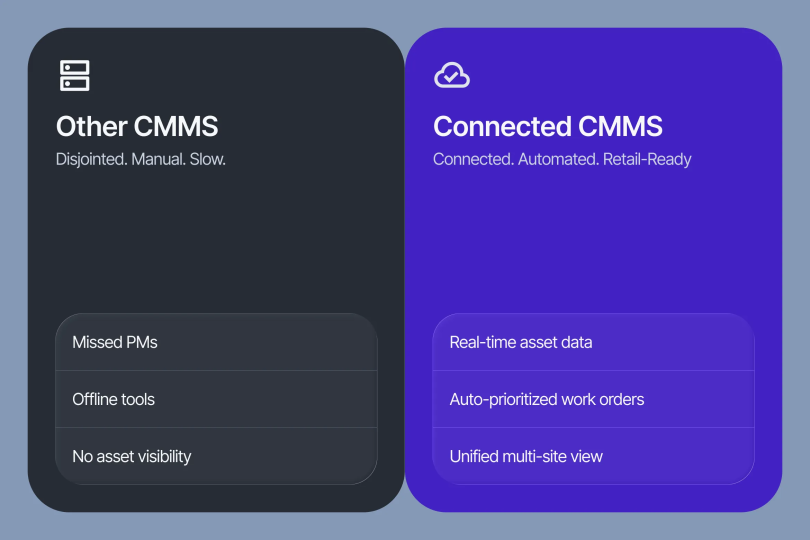
Platforms like Facilio are purpose-built for the complexity of retail. With features like unified dashboards, seamless multi-site coordination, and proactive maintenance tools, Facilio addresses the gaps that legacy systems leave behind.
Just ask King Kullen.
By deploying Facilio across its food retail portfolio, King Kullen gained centralized oversight and improved operational efficiency—proving how a future-ready CMMS can directly elevate business performance.
📅 See Facilio in action.
Experience how Facilio simplifies multi-store maintenance.
Schedule a personalized demo and see what a modern retail CMMS should really look like.
More from Facilio












